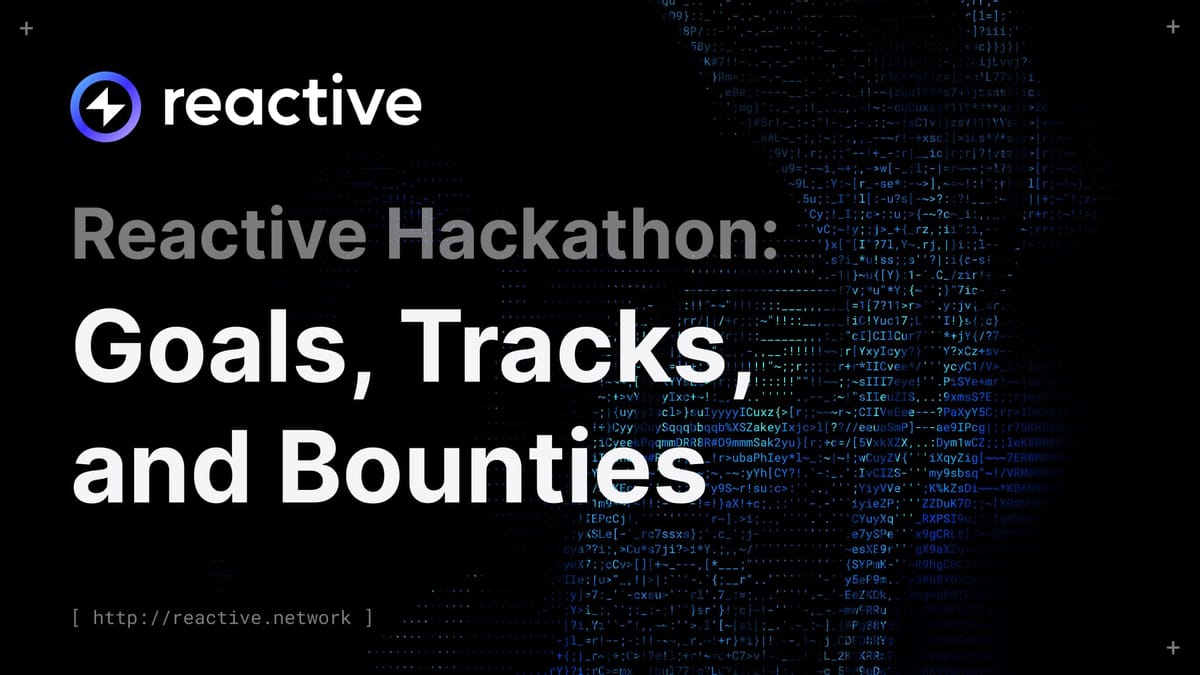Reactive Hackathon: Goals, Tracks, and Bounties
In this article, we’ll cover the key details of the hackathon, including its goals, tracks, and bounties, making this your one-stop reference for all things Reactive Hackathon.

The Reactive Hackathon is in full swing, offering participants a chance to dive deep into decentralized application development using Reactive Smart Contracts (RSCs) on the Reactive Network. In this article, we’ll cover the key details of the hackathon, including its goals, tracks, and bounties, making this your one-stop reference for all things Reactive Hackathon.
Overview of What We’ll Cover:
- Goals of the Hackathon
- Why Join the Hackathon
- Hackathon Tracks
- Submission Requirements
- Conclusion
Goals of the Reactive Hackathon
The primary objective of the Reactive Hackathon is to enable participants to explore innovative use cases for Reactive Smart Contracts and contribute to the development of the Reactive ecosystem. Here’s a breakdown of the hackathon’s goals:
- Discover New Use Cases: We aim to see creative implementations of RSCs that bring automations or cross-chain functionality to blockchain applications.
- Get Good Code Examples: Clear and functional code examples will help others in the community understand and build on Reactive Network technology.
- Engage Active Developers: We want more developers to actively use Reactive Network in their projects, growing the ecosystem.
- Improve Our Tech and Documentation: Feedback from participants will be invaluable in refining both the tech stack and documentation.
- Have Fun: This hackathon is also about having a good time exploring new technologies and working alongside like-minded developers.
As discussed in a recent live stream, the hackathon provides ample time (8 weeks) to experiment, build, and refine your projects.
Why Join the Hackathon?
- Innovative Technology: Reactive Smart Contracts (RSCs) allow decentralized applications (dApps) to react to on-chain events autonomously, which means you can build more efficient and responsive systems. Whether it’s automating DeFi protocols or creating cross-chain solutions, Reactive Network provides tools that open up new possibilities.
- Familiar Tech Stack: Developers familiar with Solidity will feel at home in this hackathon. You don’t need to learn a completely new language—Reactive Network is fully compatible with EVM (Ethereum Virtual Machine), making the transition smooth.
- Career-Enhancing Experience: Participating in the Reactive Hackathon isn’t just about winning. It’s about enhancing your portfolio, gaining experience with cutting-edge technology, and building connections in the blockchain ecosystem.
- Active Support and Community: Our team and community are highly responsive. If you ever run into roadblocks, we’re here to help via Discord and Telegram.
- Big Prizes and Grants: A total prize pool of $50,000 is up for grabs, with prizes distributed across various tracks. Grants will be awarded to promising projects to support further development.
Hackathon Tracks
The hackathon features multiple tracks, catering to both seasoned developers and newcomers. Here’s a detailed look at each track:
1. Open Track
- Prizes: 1st place: 5000 USDT, 2nd place: 2000 USDT, 3rd place: 1000 USDT
- Description: This track is for those who want to get creative and explore innovative ways to use RSCs. Whether you’re improving existing DeFi workflows or creating entirely new dApps, this track offers flexibility and freedom to innovate.
2. Pangolin Track
- Prizes: 1st place: 2000 USDT, 2nd place: 1000 USDT, 3rd place: 500 USDT
- Description: Sponsored by Pangolin Exchange, this track challenges participants to apply RSCs to the DEX (decentralized exchange) space. Whether you integrate new features or optimize user experience, creativity and relevance to DEX operations are key here.
3. Template Deployer Track
- Prizes: 1st place: 2000 USDT, 2nd place: 1000 USDT, 3rd place: 500 USDT
- Description: This track focuses on creating a user-friendly Web3 dApp that allows users to deploy predefined RSCs without needing to write code. The goal is to make RSCs accessible to a broader audience, automating complex workflows for the end-user.
4. No-Code Track
- Prizes: 1st place: 800 USDT, 2nd place: 400 USDT, 3rd place: 200 USDT
- Description: This track is designed for participants who don’t have coding skills but can contribute valuable ideas. You’ll be asked to describe use cases for RSCs in detail, focusing on their business and technical value.
5. Bi-Weekly Challenges
- Prizes: 700 USDT per challenge
- Description: These mini-challenges are designed to keep things active and fun throughout the hackathon. Every two weeks, a new challenge is introduced, allowing participants to solve smaller, more focused problems using RSCs.
Conclusion
The Reactive Hackathon is an incredible opportunity to work with cutting-edge technology, showcase your skills, and win big prizes. Whether you’re a seasoned developer or a newcomer with fresh ideas, there’s a track for you. We encourage you to join, share with friends, and make the most of this experience to enhance your skills, your GitHub portfolio, and your standing in the blockchain community. You still have time to register and take part in the Reactive Hackathon.
Stay tuned to our Discord and Telegram channels for updates, and don’t forget to check out the workshops on YouTube for hands-on guidance.
About Reactive Network
The Reactive Network, pioneered by PARSIQ, ushers in a new wave of blockchain innovation through its Reactive Smart Contracts (RSCs). These advanced contracts can autonomously execute based on specific on-chain events, eliminating the need for off-chain computation and heralding a seamless cross-chain ecosystem vital for Web3’s growth.
Central to this breakthrough is the Inversion of Control (IoC) framework, which redefines smart contracts and decentralized applications (DApps) by imbuing them with unparalleled autonomy, efficiency, and interactivity. By marrying RSCs with IoC, Reactive Network is setting the stage for a transformative blockchain era, characterized by enhanced interoperability and the robust, user-friendly foundation Web3 demands.





